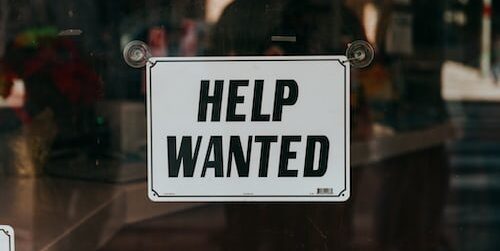IS IT TRUE? Nobody wants to work anymore? And that’s why businesses are short-staffed?
First, let’s acknowledge, only the most masochistic among us truly wants to work. Raise your hand if you’d rather put in a mind-numbing eight in the cubicle, or a cushy five on the golf course. That’s what I thought.
Beyond that, most of us have had to bring home a paycheck at some point. You can try to avoid it, but that’s work too.
So why do I keep seeing it suggested that we’re a bunch of slackers? Managers can’t find enough workers, so presumably, “nobody wants to work anymore,” followed by the unspoken… “those lazy bums.” As it turns out, that’s a somewhat unfair and rudimentary response to the staffing dilemma facing many area businesses.
The challenge of filling shifts is most visible in the food service industry. That’s what we see when our favorite dining spots aren’t open seven days a week and not nearly as late as they used to be. Offices and retail establishments aren’t immune to the problem, but as long as their lights are on during regular business hours, we don’t see any issues.
I reached out to a couple of our more successful restaurateurs and both confirmed that finding qualified workers is a challenge. And these are businesses that pay and treat their employees well. With “Now Hiring” and “Help Wanted” signs adorning many area storefronts, it seems competition is fierce for employees.
It wasn’t that long ago when employers had an easier time sporting a full crew, back when there were more qualified applicants than available jobs. Not anymore. Now, in order to have enough workers to adequately serve clients and customers, employers have to offer better wages, better bennies, and flexible work schedules. Most owners will tell you the hardest part of running a business is managing employees. And they were saying that even before the recent scarcity of warm bodies.
As far as the service industries go, one reason for staff shortages is the fact that waiting tables is often tedious and always tiresome. Good tips can help soothe sore feet, but not every shift is as busy as the night you were there.
Some time ago I heard the reason Jimmy John’s hadn’t yet opened their 3rd Street location was because they couldn’t find enough workers. I don’t know if that’s still true, but they’ve put money into the building and it looks like it’s ready to go, so what’s the holdup, if not for staffing?
Getting back to the original question, I got some answers from the area employment experts at Michigan Works. U.P. district CEO Debb Brunell confirmed the worker shortage, particularly with smaller organizations, but offered reasons other than generational sloth.
“Lack of childcare availability and cost for care prohibits many families from both parents working, also caring for aging parents, baby boomers retiring, addiction issues, disabilities and other reasons.”
I’ll also add that we seem to have less people aging into the workforce. Graduation numbers at MSHS over the past several decades have seen a fairly significant decline. And while NMU’s enrollment is up a little this year, it’s still a couple thousand less than what it was at its peak.
And then there’s the issue of affordable housing. A lot of our employee shortages are in entry-level jobs, which means they likely pay less than the average. An hourly rate hovering around minimum wage won’t pay the rent. It’s hard to work where you can’t afford to live.
So, getting back to the notion that area couches are full of ne’er-do-wells and welfare scammers, Brunell has statistics that refute those claims. “The 3.7% unemployment rate is lower than it was prior to the pandemic, so no, more people are not sitting around collecting unemployment. The number to pay attention to is the Labor Force Participation Rate (LFPR.) It measures our active workforce.”
It turns out the U.P.’s active workforce is less than the state average, due in part to an older population. In other words… we’re faced with a smaller pool of potential employees. Unless there’s a sudden baby boom, there’s really nothing to indicate a change in our LFPR any time soon.
Short staffs and shorter hours are probably going to be around awhile. Maybe we’ve just gotten too big for our britches.
Bonus Words
Happy Friday the 13th, unless you happen to suffer from triskaidekaphobia. That, of course, is the fear or avoidance of the number 13. In most cases it’s easy enough to stay clear of that number… like choosing not to stay on the 13th floor of a hotel, or declining to be number 13 when in line for license renewal, but you can’t get away from Friday the 13th.
Dragging Fridays into the equation goes back to the 14th century, when apparently some bad things happened on a Friday the 13th. Back then, things like curses and bad luck were more readily accepted as a certainty, so the legend took hold. Regardless of how we got here, just remember, not everyone will be able to enjoy this Friday as they might others. You should probably avoid those people.
There are plenty of other phobias, some of which are legit and others that seem, well… whacko. The fear of confined places, claustrophobia, is a real thing, and not all that uncommon, while pogophobia is the fear of beards. I guess that’s a real thing too, but c’mon. Beards? If it’s yours, shave it!
And finally there’s a phobia of recent design that we’ve probably all felt at one time or another. It’s called nomophobia… the fear of being without mobile phone coverage. Been there and done that, but Lord help us if it happens on Friday the 13th.


